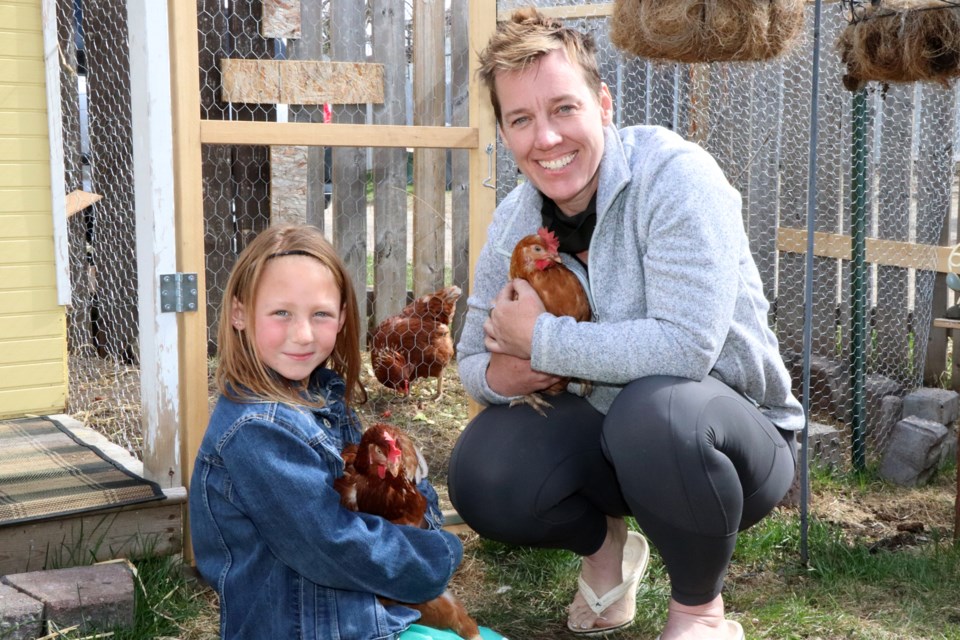INNISFAIL – From a dark barn in Linden with 6,000 other fowl two weeks ago, four chickens that were raised for consumption are now seeing daylight and feeling the joy of being an urban pet in the town of Innisfail.
The long-awaited Innisfail Urban Hen Pilot Program officially began May 11, and Lisa Reid, whose heart was broken by town council’s rejection of urban chickens more than two and half years ago, was the first and only citizen in line at town hall to enthusiastically pay $65 for a licence.
“It’s about time,” she said, adding it was vindication of her bitter disappointment of town council’s decision in 2018 to reject an urban hen program. "Town council gave no reason why they had to vote 5 – 2 against. I was absolutely devastated. I thought for sure we had it from the results of the 2018 survey.
“It has been a long three years but I bought myself a nice little property and I made a little coop,” she added, noting she had to find a new home for her past hens after town council’s 2018 rejection. But with council’s approval of the pilot program last March, Reid can smile broadly again.
“I’m really excited and I finally have my four birds and it’s all legit and nobody can come and take them away from me again,” she said.
There will be a total of five licences granted and if the program proves successful after two years, council will then be asked to approve it permanently.
Last week, following a successful inspection by a local peace officer of her urban hen set up, Reid was totally free to proceed with raising four ISA Brown female chickens as pets. The birds were recently acquired from a Mennonite farm in Linden, a village 80 kilometres southeast of Innisfail.
“They are very healthy birds and anywhere from 18 to 20 weeks old. They are already producing eggs, which is really crazy,” she said with a chuckle. “They are so comfortable here. They adjusted very quickly.
“They are known as commercial birds and that was what they were used for at this farm. They had never seen the outside of the building. The four that came with me have a brand-new life.”
And a comfortable one at that. “They love the outdoors,” she added.
Reid is an expert at raising urban hens. In preparation for their arrival, she had to get written approval from neighbours with adjacent back and side yards, have a town-approved coop and provide proof of completion of an approved urban hen keeping course.
The neighbours and the course were not problems, and her six-year-old granddaughter Izabelle provided an easy solution for a coop. Izabelle told grandma she wanted her four-foot playhouse to be the perfect home for the quartet of urban hens, whose names would soon become Flower, Cheeky, Felonious and Coq au vin.
“They are so sweet,” said Izabelle, who named Cheeky and Flower.
The coop was completely ready by the time of their arrival. It’s also fully insulated and wired-in for soothing warmth from a safe coop heater when the cold of winter comes. There is a venting system for proper air circulation. Reid has also created a little trap door for the birds to move back and forth to a fully enclosed outdoor area for fresh air, feeding and exercise.
“These birds are hearty. They are quiet, and so simple, and cheap to feed,” said Reid, adding the birds dine on poultry layer feed, and all kinds of leftover vegetables from inside the home, and especially water melon, which the hens love.
As for expert ongoing maintenance for the hens’ health, Reid said there is a veterinarian in Red Deer who will treat them.
“It is not an expensive hobby. They are easily compostable when it comes to their waste and they don’t smell for birds,” said Reid. “They are super great to teach children for chores and responsibility. It is a fun, fun hobby to have. The neighbours won’t have any problems with this.”
Reid is inviting any citizen who is thinking of getting an urban chicken license and needs support, advise or help, to send her an email at: [email protected]



